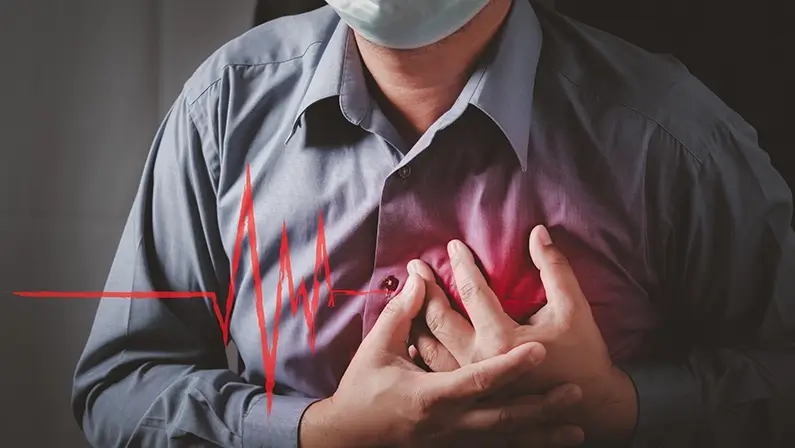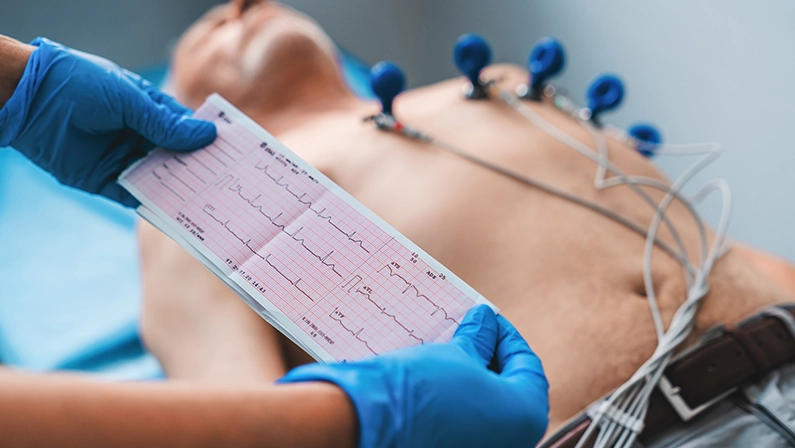Your heartbeat is a vital sign of your overall health, and any irregularities can be concerning. In this article, we will delve into the risks associated with irregular heartbeats, highlight important warning signs, and provide guidance on seeking peace of mind.
Whether you are experiencing occasional palpitations or have been diagnosed with a heart condition, this blog aims to provide valuable insights and knowledge to empower you in taking care of your heart health.
Importance of Knowing When to Worry About an Irregular Heartbeat
Many ask, “Are irregular heartbeats common?” Well, your heartbeat is one of the most fundamental indicators of your cardiovascular health. It is normal for it to vary slightly from time to time, especially during physical activity or emotional stress. However, when your heartbeat becomes consistently irregular, known as arrhythmia, it is important to understand when to be concerned and seek medical attention.
What are Irregular Heartbeats (Arrhythmias)?

Arrhythmias refer to abnormal heart rhythms that deviate from the normal sinus rhythm. They can manifest as heartbeats that are too fast (tachycardia), too slow (bradycardia), or irregular in their pattern. Arrhythmias occur due to disruptions in the electrical signals that regulate the heart’s contraction, affecting its ability to pump blood effectively.
Types of Irregular Heartbeats
Here are some of the types of irregular heartbeats:
- Atrial Fibrillation (AFib): This is the most common type of arrhythmia characterized by rapid and irregular electrical impulses in the heart’s upper chambers (atria). AFib can increase the risk of stroke and other complications.
- Supraventricular Tachycardia (SVT): SVT is a rapid heart rate originating above the ventricles. It can cause a sudden racing heartbeat and occasionally lead to fainting or dizziness.
- Ventricular Arrhythmias: These are irregular heart rhythms that originate in the heart’s lower chambers (ventricles). Ventricular tachycardia and ventricular fibrillation are serious conditions that require immediate medical attention.
- Bradycardia: This refers to a slow heart rate, usually fewer than 60 beats per minute. While some athletes and individuals may have naturally low heart rates without any symptoms, bradycardia can also indicate underlying health issues.
It’s essential to remember that not all irregular heartbeats are life-threatening. However, knowing the specific types of arrhythmias and their associated risks can help you differentiate between harmless irregularities and those that require medical evaluation and treatment.
Causes of Irregular Heartbeats
Irregular heartbeats occur when your heart beats too fast, too slow, or has an irregular rhythm. There are various causes of how serious is an irregular heartbeat, including:
- Genetics
- Heart disease
- High blood pressure
- Smoking
- Drinking too much alcohol
- Imbalance in electrolytes
- Stimulants such as caffeine, nicotine, or illegal drugs
Depending on the cause, your doctor may recommend lifestyle changes or medication to regulate your heartbeat.
How Do I Know If My Irregular Heartbeat Is Dangerous?
Irregular heartbeats don’t always have symptoms, but if you are experiencing any of the following, it’s important to speak with your healthcare provider:
- Palpitations (sensations of a racing, fluttering, or pounding heart)
- Dizziness or lightheadedness
- Shortness of breath
- Chest pain or tightness
For some, the frequency of these symptoms is low and doesn’t affect their daily lives. But if you’re experiencing them regularly or are finding them hard to manage, it’s important to seek medical attention promptly.
Is Having An Irregular Heartbeat Bad?
It’s essential to keep track of any irregular heartbeats and keep your doctor informed, especially if you experience any of the following:
- Fainting spells or unconsciousness
- Shortness of breath that’s getting worse
- Chest pain that’s getting worse or lasting longer
- A heart rate that’s over 120 beats per minute at rest
These symptoms could be a sign of a dangerous arrhythmia or a more severe underlying heart issue. Seeking emergency care is strongly recommended if you experience any of these symptoms.
Diagnosing Irregular Heartbeats
Detecting and diagnosing irregular heartbeats, or arrhythmias, is crucial for proper treatment and management. If you suspect you have an irregular heartbeat, seeking medical attention for an accurate diagnosis is important.
How doctors diagnose arrhythmias
When you visit your healthcare provider with concerns about irregular heartbeats, they typically begin with a thorough medical history and physical examination. They may ask you questions about your symptoms, lifestyle habits, and family history to better understand the potential causes of your arrhythmia.
In addition to the initial assessment, doctors may use various tests to diagnose arrhythmias.
Tests for irregular heartbeats

Here are some of the common tests that doctors may use to diagnose irregular heartbeats:
- Electrocardiogram (ECG): This test records the electrical activity of your heart and can reveal abnormalities in your heart’s rhythm.
- Holter monitor: This portable ECG device is worn for 24 to 48 hours to monitor your heart’s activity continuously. It helps capture any irregularities that may occur throughout the day.
- Echocardiogram: This non-invasive test uses sound waves to create images of your heart. It provides detailed information about the structure and function of your heart.
- Stress test: This test involves exercising on a treadmill or stationary bike while your heart activity is monitored. It can help detect irregular heartbeats that may occur during physical exertion.
By performing these tests, doctors can gather valuable information about your heart’s rhythm and structure to make an accurate diagnosis.
Treatment and Management of Irregular Heartbeats
Once a diagnosis of irregular heartbeats is made, your healthcare provider will discuss appropriate treatment options and management strategies based on the severity of your arrhythmia and your overall health.
Lifestyle changes

In many cases, lifestyle modifications can help manage and prevent irregular heartbeats. Your doctor may recommend the following changes:
- Reduce stress levels through relaxation techniques like meditation or yoga.
- Avoid excessive consumption of caffeine, alcohol, and tobacco.
- Maintain a healthy weight through regular physical activity and a balanced diet.
- Manage underlying conditions such as high blood pressure, diabetes, or thyroid disorders.
Adopting these healthy lifestyle habits can significantly reduce the frequency and severity of irregular heartbeats.
Medications
In some cases, medications may be prescribed to regulate your heart’s rhythm and prevent further irregularities. Commonly prescribed medications can include:
- Antiarrhythmic drugs: These medications help restore a normal heart rhythm by suppressing abnormal electrical signals.
- Beta-blockers: These medications slow the heart rate and reduce the workload on the heart.
- Blood thinners: In cases where arrhythmias increase the risk of blood clots, blood thinners may be prescribed to prevent complications.
It’s important to note that medication choices and dosage will vary depending on the type and severity of your arrhythmia. Your doctor will work with you to find the most suitable medication for your specific needs.
Medical procedures
For severe cases or when lifestyle changes and medications are not effective, your doctor may recommend medical procedures to treat your irregular heartbeats:
- Cardioversion: This procedure uses electrical shocks to restore a normal heart rhythm.
- Ablation: In this procedure, a catheter eliminates the heart tissue causing irregular beats.
- Pacemaker or implantable cardioverter-defibrillator (ICD): These devices are surgically placed in the chest to regulate heart rhythms and prevent potential complications.
These procedures can effectively manage and correct irregular heartbeats, providing a long-term solution for individuals with persistent arrhythmias.
When to Seek Medical Attention for Irregular Heartbeats
Irregular heartbeats can range from harmless to potentially life-threatening. If you experience any of the following symptoms, seek medical attention immediately:
- Severe chest pain: If you experience sudden, severe chest pain lasting more than a few minutes, it could be a sign of a heart attack.
- Fainting spells: A doctor should always evaluate unexplained fainting or loss of consciousness, as it may be a sign of an underlying heart condition.
- Shortness of breath: If you experience sudden shortness of breath, seek medical attention immediately. It could indicate a pulmonary embolism or heart failure.
- Heart palpitations: If you feel your heart racing, fluttering, or skipping beats, make an appointment to see your doctor as soon as possible.
- Dizziness or lightheadedness: Feeling lightheaded or dizzy, especially when standing up from a seated or lying position, could be a sign of an underlying heart problem.
- Fatigue: Chronic fatigue could be a sign of heart disease, including arrhythmias.
If you experience any of these symptoms, don’t hesitate to seek medical attention.
Work Closely With Your Healthcare Provider
Irregular heartbeats, or arrhythmias, are a common condition that can range from benign to severe. It’s important to stay vigilant about your heartbeat and speak to your healthcare provider about any concerns. You can manage your arrhythmia and maintain a regular heartbeat by working closely with your doctor and following appropriate treatment options.
Aether Health – Kingwood ER is a great choice for board-certified physicians ready to handle all your emergency needs, including irregular heartbeat. The physicians at Aether Health – Kingwood ER in Kingwood, Texas, are highly trained in emergency medicine and have access to advanced facilities and equipment to ensure prompt and accurate diagnoses and treatments. Visit us today!




